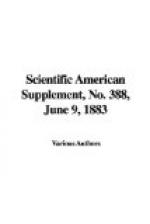The average quantity of food required to sustain an ordinary man in health and strength, I have previously stated, is about two pounds avoirdupois daily, and an equal weight of oxygen is necessary to the integrity of the vitalizing processes undergone by the food, and to maintain the physical temperature. When the requisite supply of oxygen is reduced, the extrication of heat within the system is promptly diminished, but the vitalization of digested food is unfavorably affected much more slowly, but with equal certainty. If the quota of oxygen existing in the arterial blood of the vessels whose duty it is to supply the vital fluid to the absorbent system, be inadequate to enable these operations to go on properly, the life-giving processes must necessarily be imperfectly accomplished. Under these circumstances the digested material is imperfectly vitalized, and is therefore inadequately fitted to be used in building up and repairing the living body. But its course in the system cannot be delayed, much less stopped.
The blood possesses a definite constitution, which cannot be materially altered without the rapid development of grave, perhaps fatal consequences. The nutritive matters received into the blood must be given up by it to the tissues for their repair, whether such materials are well or ill fitted for the vital purposes. Dr. B.W. Carpenter, of London, the celebrated physiologist, makes the following pertinent statements on this subject, which I condense from his great work on physiology: “We frequently find an imperfectly organizable product, known by the designation of tubercular matter, taking the place of the normal elements of tissue, both in the ordinary process of nutrition, and still more when inflammation is set up.
From the examination of the blood of tuberculous subjects it appears that, although the bulk of the coagulum obtained by stirring or beating is usually greater than that of healthy blood, yet this coagulum is not composed or well elaborated fibriae, for it is soft and loose, and contains an unusually large number of colorless blood corpuscles, while the red corpuscles form an abnormally small proportion of it. We can understand, therefore, that such a constant deficiency in capacity for organization must unfavorably affect the ordinary nutritive processes; and that there will be a liability to the deposit of imperfectly vitalized matter, instead of the normal elements of tissue, even without any inflammation. Such appears to be the history of the formation of tubercles in the lungs and other organs.




